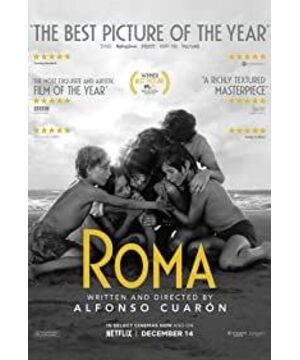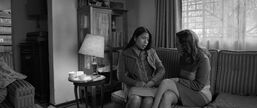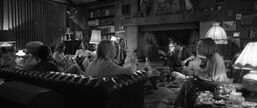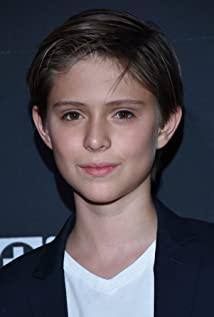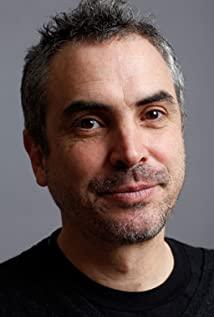1
What is technology?
Technology is a tool.
If we applaud a movie for being technical, it's just a failure of expression.
As the saying goes: just practice, don't say, foolish style.
Technology should ultimately support expression, and should not completely overshadow it.
Just look at Alfonso Cuaron.
What I have always admired about Cuaron is that he always uses superb technology to construct his artistic expression, and he seems to be able to do it with ease.
Especially "Children of Men" and "Gravity", Cuaron has done a very good combination of the two. This is rare among contemporary directors.
What's even more unexpected is that in "Roma", Cuaron went a step further and completely made the technology invisible and became a means of restoring the real time and space.
In "Roma", there is no complicated long-shot schedule in "Children of Man", and there is no 360-degree coverage of the universe in "Gravity", but there are only a few middle-class Mexican neighborhoods reconstructed according to Cuarón's memory.
This seems to be a kind of technical dimensionality reduction, but it is actually an exploration of technology in the nature of film, that is, "constructing real time and space".
From another point of view, this is also Caron's confidence. He no longer needs to use technology to directly poke the audience's eye, but can calmly use it as a pure expression tool.
This is the embodiment of Cuarón's maturity, and it is exactly what he said: "Rome" was not built in a day.
Many people describe "Roma" as a love letter from Cuaron to his hometown.
This too poetic definition obviously fails to sum up "Roma".
If we compare "Roma" with "Sunny Day", we can see the difference.
The two are also about the memories of childhood, but Jiang Wen was only 29 years old when he filmed "Yang Can", which is not far from the youth he wrote. Therefore, "Sunshine" is bright, flying, and clean. This kind of "cleanness" is reflected in the filming, Jiang Wen repeatedly asked everyone to sweep the streets, because in his memory, childhood was spotless.
And Cuaron, who filmed "Roma", is nearly sixty years old. More than 40 years have passed since he wanted to shoot.
Such long years have opened up not only the distance of watching, but also the scope of watching.
"Roma" has been calm and restrained from the very beginning, like a middle-aged man re-entering the streets of his childhood. Even if he has infinite affection in his heart, it has been stuffed into the deep by the years.
As for the protagonist of the story, it is not "I", but "them".
Together, these senses of distance create a sense of history that transcends private memory, making the everyday life presented in "Roma" not just everyday life, but a condensed corner shrouded in historical scars, social unrest, class differences, and emotional loss at the same time .
2
The first shot of "Roma" should be the most impressive shot I've seen in the past two years.
The black and white picture, the mottled stone-plastic floor covers the entire screen, listen carefully, there are birds chirping outside the screen, someone opens the iron door, walks hurriedly, takes a bucket and a mop, picks up water, wipes the floor, and then Water splashed on the floor, the sound of water flowing from far to near. Finally, the water wave broke into the picture and stained the floor, reflecting the sky above, and a plane slowly passed by.
The story of the film begins with such a most everyday spectacle.
By the time the second plane passed, 36 minutes later, the maid Corio finally got her hands free and cleaned up the shit in the yard.
From this we go back to the first 36 minutes of the plot, and it is actually Cuaron who quietly presents us with Corio's day.
She was caught up in endless trivial matters, cooking, washing, washing dishes, brushing cups, coaxing the children, taking care of the master... When it was late at night and all the lights were turned off, she was able to pour herself a glass of water, Grab a handful of dog food for the dog.
Yes, this plot is not random. It is through such tiny hints that Cuaron ties the fate of Corio and the dog together.
There are many other similar hints.
For example, a family of seven is sitting on the sofa watching TV, while Cleo can only curl up on a cushion.
Another example is what the old maid said: "These dogs are really exhausted. The children play with them all the time."
...
Although this counterpoint is cruel, Cuaron is not in any way critical, he is just presenting a fact, a natural class difference.
This class difference is not only reflected in the status of masters and servants, but also in the way they deal with pain.
The two women in the film, the hostess Sophia and the maid Corio, face a similar dilemma. Sophia's husband eloped with her lover, and Corio was abandoned by her boyfriend because of an unexpected pregnancy.
The pain of the two people is comparable, but during the whole process of suffering, we can see that Cleo is always silent and forbearance, while Sophia can shout and hysterically. It seems that "pain" itself also has a certain class nature. Only those with high status are allowed to roll around, while those at the bottom can only be silent.
It's not over yet. Facing her runaway husband, Sophia can find someone to cry, drink to drown her sorrows, and let the children write letters to her husband until she finally buys a new car, changes a job, and packs up her mood again; But Cleo could only face it alone. She could neither find comfort from others nor change her own situation. She had no choice but to stay in this pain.
What is more cruel?
These are the two scenes where Sophia scolds Corio in the film.
In the first scene, the husband used the excuse of a business trip to go on a date with his lover. Sophia knew it well, but she could only watch her husband leave. Then she had a seizure and loudly asked Cleo why she didn't clean up the shit in the yard, as if that was what caused the couple to fall apart. Kelio, who was beside him, froze for a moment, bowing his head and saying nothing.
Another scene is more ruthless, Sophia calls a friend to cry and is overheard by the child. She rushed out the door and beat the child, and asked Cleo viciously, "Why didn't you stop him? Why? Get me out now!"
You know, this scene is closely followed by the scene where Corio was abandoned. At the end of that scene, her boyfriend Fermin yelled at Cleo, "Go away, you bloody maid!"
And Sophia's words almost repeated the abuse again without swearing.
This way of presenting class differences is more cruel than those outright binary oppositions.
It quietly transformed a conscious oppression into an unconscious accidental injury.
Frankly speaking, the Sophia family is a very good employer. The children are close to Keleo. Sofia is also very kind to Keleo. She personally takes her to the maternity check-up and even buys her a new crib.
When all is well, the two women can even get along like friends. However, when the pain comes, the cruelty of the class also comes quietly.
Its cruelty is: my pain is greater than your pain.
Yes, when everyone is good, naturally I am good, and so are you; but when everyone is bad, I am not good, so don't think about it.
Until the end of the film, when Sophia finally picks up and is ready to start a new life, she semi-forced to take Corio on a trip. There is even such a subtext behind it: I'm all healed, why are you still suffering? Even though Corio had just lost her child at the time.
This kind of calm, all reasonable cruelty is what Cuaron is particularly good at.
It allows us to see a helpless inevitability that cannot be resolved. But there is no way, because this is life.
3
Compared with emotional wounds and class differences, a deeper layer of scars comes from the social level.
It's interesting that the film's presentation of the entire social environment is in small talk.
First at the breakfast table, Sophia's child talked about witnessing soldiers killing students on the street and imitating the moment when a bullet headshot; then at the aboriginal party, the old maid pointed to the man at the next table and said to Keleo, " His son was killed not long ago because of a land dispute." And when Cleo was doing the dishes, another maid said, "I heard that the government people went to the village, and your mother's land was forcibly taken away. "
After a series of secret writing, finally in the 94th minute of the whole film, through the window of the furniture store, a panning camera swept through, and we were able to see a real street riot.
That was Mexico in 1971. As early as 3 years ago, in 1968, Mexico had just broken out the most notorious massacre in modern history - the Tlatelolco massacre .
During the massacre, the students who were marching were shot by the government guards, and several people were killed.
Three years later, the shadow of this massacre has not dissipated. What Cleo witnessed was another massacre.
This is the splendid part of the film, just as the camera turns from the street back to the furniture store, we see several people rush in and kill the hiding civilians. At this time, a gun is pointed at the pregnant Cleo. When the camera is zoomed out, we find that the gunman is the boyfriend Fermin who abandoned her.
This is a very absurd scene.
No one could have imagined that the only time a family of three would get together would be in this way.
So why?
In fact, the answer is not difficult to find.
I still remember a scene in the film, Ke Leo and the owner's family went to the country manor as a guest, where the old maid took Ke Leo into a house, pointed to the dog's head hanging on the wall and said, "These are the people who have lived here. dog. You see, this one died in 1911."
1911 was a special year. It was in the spring of this year that the Mexican Revolution achieved a phased victory, the old leaders stepped down, and the revolutionaries welcomed a new president to power.
However, after the new president came to power, he did not fulfill his promise to return the land to the Indians, leading to further unrest in Mexico.
In the blink of an eye, the life of the aborigines has not improved. They have always been at the bottom, their culture has withered, and their land has been lost.
Corresponding to the most direct scene in the film, the white people shoot at the countryside for fun, implying that the colonists did harm to the aboriginal culture.
And the next scene is the fire that destroyed the countryside.
Notice that the firefighting is almost exclusively indigenous people, as well as children who have not yet established a sense of class. The grown-up white people all stood by, even conversing with their glasses in hand.
Afterwards, the aboriginal who played the divine beast sang a song to the ruins. The lyrics were unknown, but it was undoubtedly an elegy.
From this we know that another layer of scars attached to Corio is the decline of the entire indigenous group.
Many of them live in slums, have no good education, and have no room for advancement.
The only way out for women might be to be a maid, and maybe even lucky to find a middle-class family like Cleo did.
And men, like Fermin, thought martial arts could save fate. He joins the government's plainclothes organization, feels like he's made a class jump, and even looks down on Corio, who is a maid. But in fact, he was just the government's white glove, and when the government didn't want to get its hands dirty, he became the evil gun.
So there is a scene in a furniture store: a man points a gun at the child in his woman's womb.
This scene seems absurd, but it seems like an inevitable fate.
At the bottom, they have no hope of rising, and when they struggle in the same small space, they will inevitably hurt each other.
This is destiny.
In the end, Fermin turned and fled, and Cleo was shocked, and the fluids burst.
To make matters worse, the massacre caused a huge traffic jam in the city, which caused Cleo to miss the best time to give birth, resulting in the tragic death of the baby.
This ending seems to say: the future of the entire indigenous group is also killed by this country.
4
Ultimately, back to the film itself, I would like to say something.
Although "Roma" is full of high-level expression, it does not lose its sense of lightness or create too much extreme drama.
On the contrary, Cuaron is extremely restrained.
He didn't intend to use the film to deconstruct life, but to recreate a life.
As I have always believed: when you try to see life in a coherent way, life is already distorted.
And a good movie shouldn't do such silly things.
As for the history, society, class, and culture mentioned above, although they all have an impact on life, they are far from the essence of life.
So what is the essence of life?
Cuaron tells us with the "airplane" that constantly crosses the sky: life is a cycle of beginning and end, a kind of helplessness and fearlessness that will continue and must continue no matter what era you live in and what kind of pain you experience.
View more about Roma reviews


